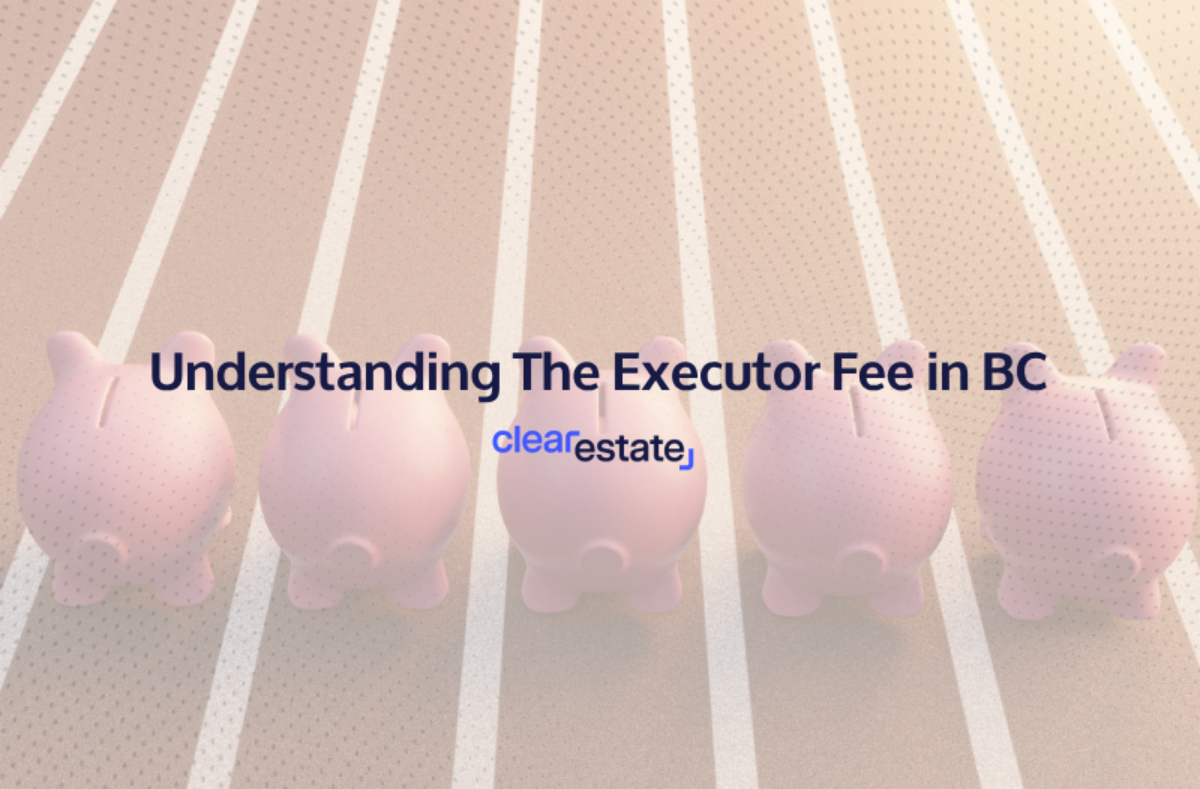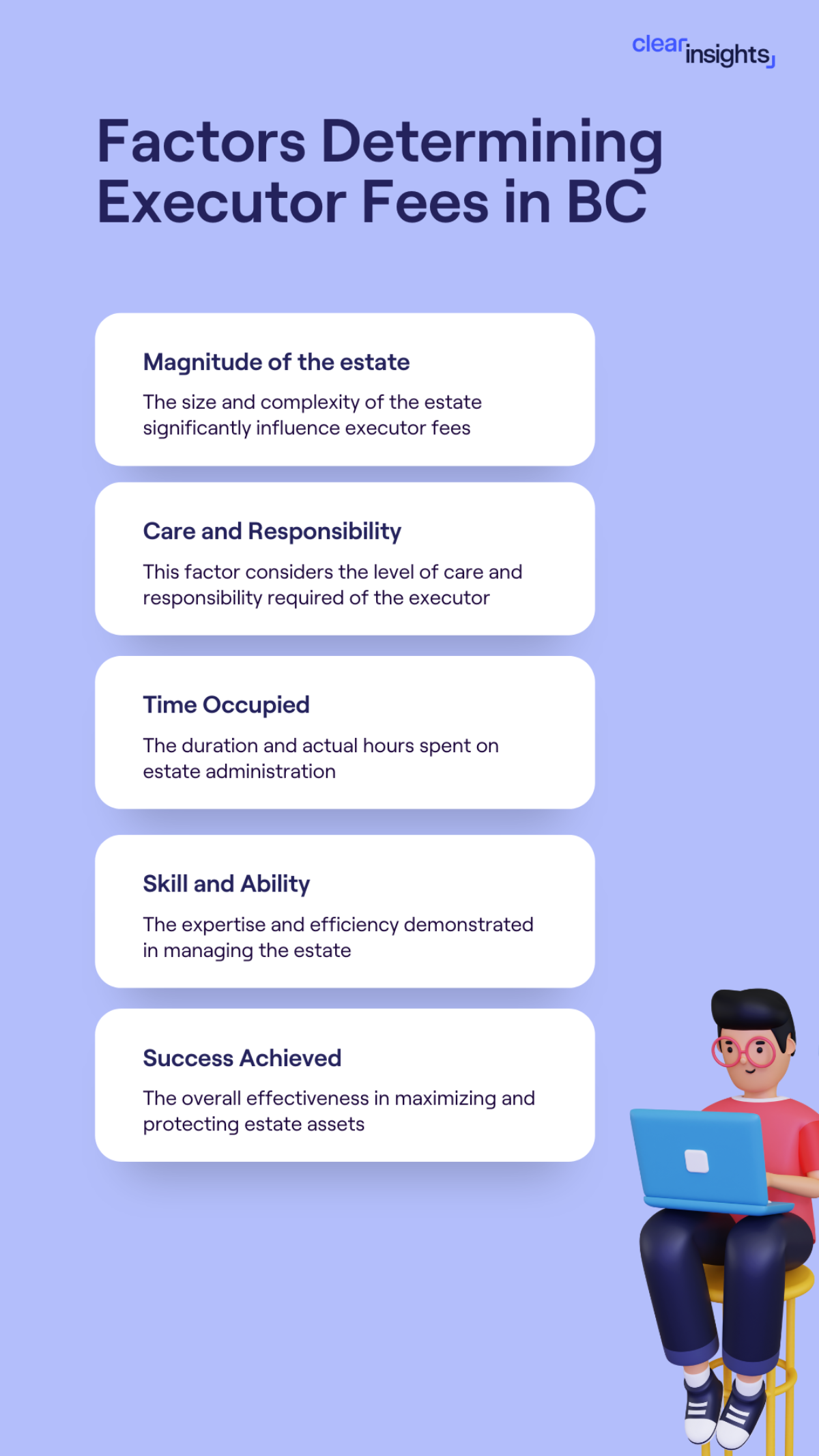Estate Settlement
Dec 04, 2024
How Do Executors Mail Inheritance Checks?
Find out how inheritance checks are mailed, including security measures and what to do if there are delays in receiving them.
Learn about executor fees in BC: maximum rates, factors affecting compensation, and how courts determine fair payment.


Article Contents
In British Columbia, executor fees are primarily governed by the Trustee Act, RSBC 1996, c 464. This legislation sets out the framework for how executors can be compensated for their work. Understanding these fees is essential for several reasons:
In this comprehensive guide, we aim to clarify a common misconception about executor fees in British Columbia. While BC's Supreme Court allows a maximum fee of 5% of the estate's value, this figure is not automatically granted or set in stone. In reality, the determination of executor fees is a nuanced process that takes into account various factors and circumstances unique to each estate.
In British Columbia, executor fees are primarily governed by Section 88 of the Trustee Act, RSBC 1996, c 464.
This legislation provides the legal basis for executor compensation and sets out the maximum allowable fees. According to the Act:
Maximum fee: Executors are entitled to a "fair and reasonable allowance" for their "care, pains, and trouble, and their time expended in or about the estate."
Fee cap: This allowance must not exceed 5% of the gross aggregate value of the estate, including both capital and income.
Important to note:
While 5% is the maximum, it is not automatically granted. The actual fee can be lower, depending on various factors we'll discuss later.
The 5% maximum fee is calculated based on the gross aggregate value of the estate. This includes:
For example:
If an estate is valued at $500,000, the maximum executor fee would be $25,000 (5% of $500,000).
In addition to the one-time fee, Section 88 of the Trustee Act allows for an annual care and management fee:
For instance, if an executor manages estate assets valued at an average of $400,000 over a year, they could charge up to $1,600 (0.4% of $400,000) for that year's management.
To help you with your calculation - use our executor fees estimator based on BC's supreme court laws:
While the Trustee Act provides for percentage-based fees, there are alternatives:
While the basic framework has remained stable, recent court decisions have provided more clarity on how fees should be determined:
These cases underscore the importance of justifying executor fees based on the actual work performed and the complexity of the estate.
While the Trustee Act sets a maximum fee, the actual amount an executor receives depends on several factors. These criteria, established through case law, help ensure that executor fees are fair and proportionate to the work involved.
The leading case in this area is Re: Toronto General Trusts Corp. and Central Ontario Railway (1905), 6 O.W.R. 350, which outlined five key factors. These factors, known as the "five factors test," are still applied by BC courts today:

1. Magnitude of the Estate
Example: An estate valued at $5 million with multiple properties and business interests would likely justify a higher percentage fee than a $500,000 estate consisting mainly of bank accounts and a single property.
2. Care and Responsibility Involved
Example: An executor managing a contentious estate with ongoing litigation or complex tax issues would likely be entitled to higher fees than one handling a straightforward estate with cooperative beneficiaries.
3. Time Occupied in Administration
Example: An estate that takes 18 months to settle due to complex asset liquidation would likely warrant higher fees than one settled in 6 months.
4. Skill and Ability Displayed
Example: An executor with accounting expertise who efficiently manages complex tax issues for the estate might justify a higher fee than a lay executor requiring extensive professional assistance.
5. Success Achieved in the Administration
Example: An executor who successfully challenges a claim against the estate, thereby preserving more assets for beneficiaries, might justify a higher fee.
6. Application of Criteria in BC Courts
Recent BC court decisions have provided further guidance on applying these criteria:
Additional Considerations
It's important to document all work done on behalf of the estate to support fee claims if they are challenged.
In British Columbia, executor fees are considered taxable income. The Canada Revenue Agency (CRA) treats these fees as self-employment income, which means they must be reported on the executor's personal income tax return for the year in which they are received. This applies regardless of whether the executor is a professional or a family member.
When filing your taxes, you'll need to report executor fees on Line 13500 of your T1 General Income Tax and Benefit Return. This line is specifically for "Self-employment income." If your total self-employment income, including executor fees, exceeds $30,000 in a calendar year, you may need to register for and collect GST/HST. It's advisable to consult with a tax professional if you find yourself in this situation.
For executor fees exceeding $500, the estate is required to issue a T4 slip to the executor. This T4 slip should be included with your personal tax return. From the estate's perspective, these fees are reported as an expense on the T3 Trust Income Tax and Information Return.
It's important to note that executor fees are taxable in the year they are received, not necessarily the year in which the work was performed. If you choose to take your fees in installments over multiple years, each installment will be taxed in the year it's received. This can be a useful strategy for tax planning purposes.
As an executor, maintaining detailed records is crucial. Keep a log of all work performed, time spent, and fees received. It's also wise to retain all relevant documents, such as court orders or beneficiary approvals, for at least six years from the end of the tax year in which you received the fees. This aligns with the CRA's standard requirement for retaining tax-related documents.
While executor fees are taxable, you may be able to claim certain expenses related to your duties as deductions against this income. Eligible expenses might include travel costs for estate-related activities, office supplies used in estate administration, or professional fees paid for estate-related work. Be sure to keep receipts for all potential deductions.
While the Trustee Act sets a 5% maximum fee, this is not a guaranteed amount. Instead, courts use this as a benchmark, with actual compensation determined by various factors specific to each estate.
As we've discussed, these factors include the estate's complexity, the time invested, the executor's skill, and the success of the administration. Balancing fair compensation with legal compliance and beneficiary expectations can be challenging, especially when dealing with complex estates or potential disputes.
Don't let uncertainty about executor fees add stress to an already demanding role. Our estate specialists can provide the clarity and guidance you need.
By scheduling a free consultation, you'll gain:
Let our team shoulder the complexities of estate administration, allowing you to focus on honouring the deceased's wishes with confidence and peace of mind.
Take the first step towards a smoother probate process today.
 Simplify Probate Today
Simplify Probate Today
Get expert guidance from our probate specialists who've helped 10,000+ families.
Book a free consultation today